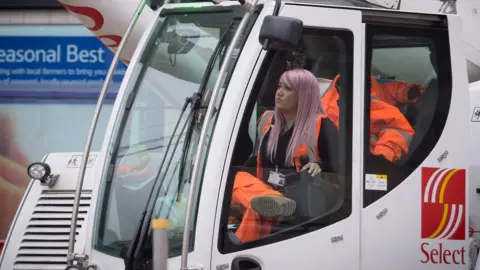Apprenticeships down amid 'frustration'
 Getty Images
Getty ImagesOne year since the introduction of the apprenticeship levy, the latest figures show there has been a 24% fall in the number of people starting in-work training.
The scheme was supposed to create three million new apprenticeships by 2020.
Instead it is causing "confusion and frustration" among employers, according to the British Chambers of Commerce .
The Department for Education (DfE) said the scheme was increasing the number of quality and higher level placements.
The DfE said employers were embracing new higher standards for apprenticeships, ranging from butchers to solicitors.
"We have recently seen an increase in the number of people starting on higher level apprenticeships, such as engineering and law, and on our new quality apprenticeship standards," a DfE spokesperson said.
Critics says apprenticeships are giving young school-leavers low-paid work and offering inadequate training.
The DfE said higher level apprenticeships, which can equate to A level or degree level training, were up 27% in the first quarter of this academic year compared to a year earlier.
People were staying in apprenticeship programmes for longer and receiving more overall training, DfE said.
The total number of new apprenticeship starts for the first half of the academic year was 206,100.
But Jane Gratton, head of skills at the British Chambers of Commerce (BCC) later on Thursday will tell a conference on apprenticeships that the levy is acting as a brake on skills development.
"Businesses recognise that apprenticeships are a crucial tool in shaping the skills of tomorrow, but the current restrictions and inflexibility of the system make it unfit for purpose," she will say.
Over the period August 2017 to January 2018 the number of new apprenticeship starts was 24% lower than a year earlier, figures from the DfE show.
The end of the academic year running up to the end of July is normally the weakest period for apprenticeship starts and the Department of Education says there is unlikely to be a significant improvement in the numbers starting in-work training over the next few months.

Analysis: Jonty Bloom, business correspondent
The Apprenticeship levy has been deeply unpopular ever since it was announced.
Larger firms see it as little more than an extra tax, even though they can claim the money back plus 10% from the government to fund their training; the majority of the money raised has not even been claimed back.
Smaller firms have their apprenticeships subsidised by the government, but many think the system is complicated, poorly organised and does not offer the training they need.
Overall since the levy started there has been a fall of about 25% in the number of new apprenticeships, which means the government's target of creating three million by 2020 is now probably impossible to hit.

Under the scheme, which was introduced in April 2017, all employers with a wage bill greater than £3m pay 0.5% of their payroll into a central fund. In return they receive vouchers which can be used to fund apprenticeships.
Smaller firms are also expected to contribute to the costs of apprenticeships unless they employ fewer than 50 people.
Reform scheme
The BCC says many firms are finding it difficult to engage with the levy system "due to its complexity", and regard it as another tax, rather than a useful way to organise training.
"For many levy payers it feels like a tax, or redirects funds set aside for other forms of workplace training," Ms Gratton will say.
She will call on the government to engage with business and training providers to adapt the system. The BCC would like the government to provide more support for small and medium-sized companies.
The Institute of Directors is also calling for reforms to the scheme.
"Today's figures add to the growing body of evidence that the Apprenticeship Levy is not working as the government intended," said Seamus Nevin, Head of Policy Research at the IoD.
Employers 'at heart'
Mr Nevin said employers were behind the levy in principle but would like to see changes to the scheme.
"The IoD has been urging the Government to reform the system so that larger companies can pass more of the funds down their supply chain to the places it is really needed, and to give firms longer to use the money, so that it is spent on the most valuable apprenticeships and on subjects where there are the biggest skills shortages."
In its response, the Department for Education said: "We have put employers at the heart of designing new, higher quality apprenticeships and our new apprenticeship service gives levy-paying employers direct access to and control over their apprenticeship funding.
"Our reforms have fundamentally changed what apprenticeships are, and the long-term opportunities they can provide for employers and apprentices alike."
